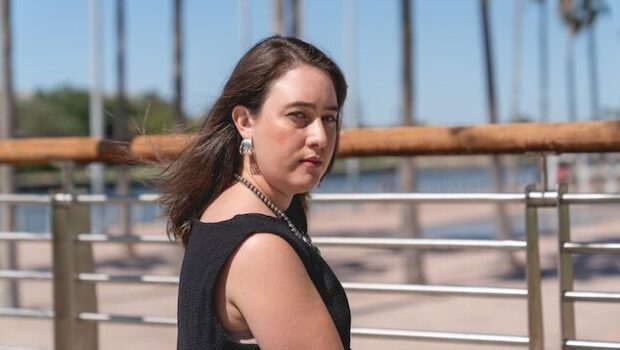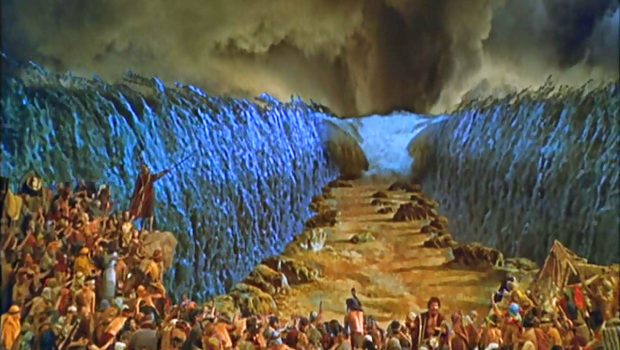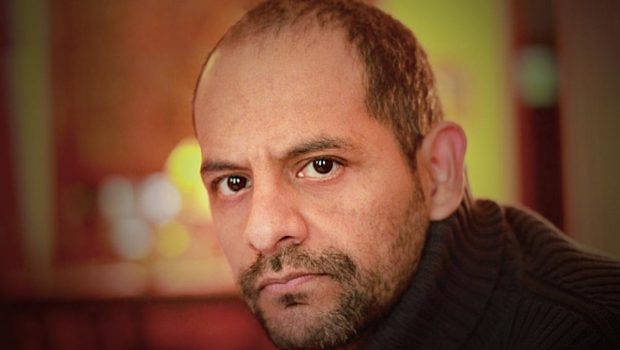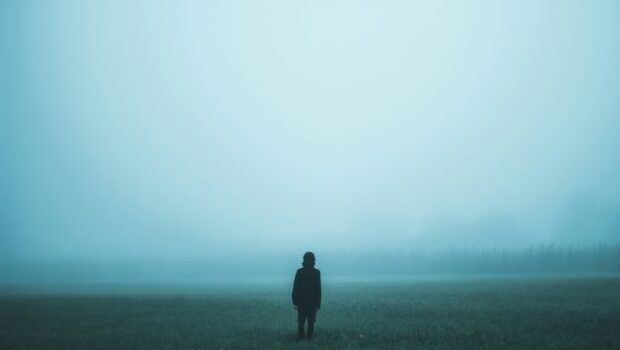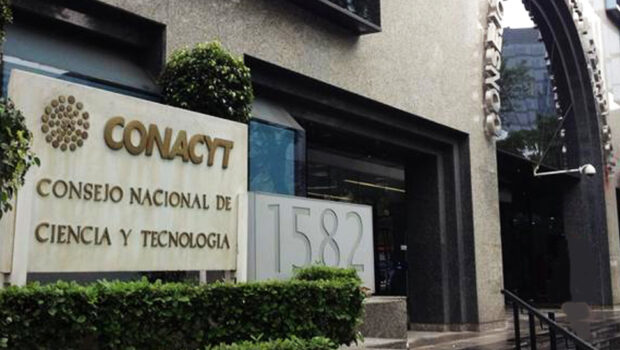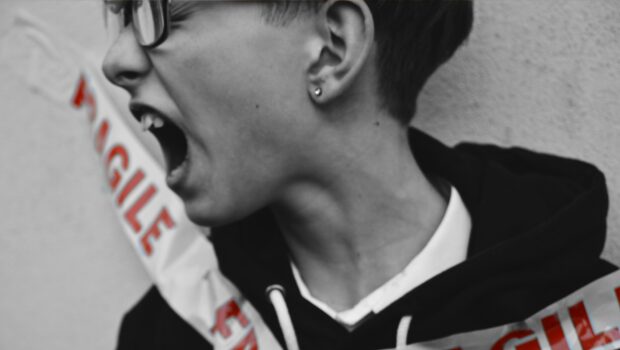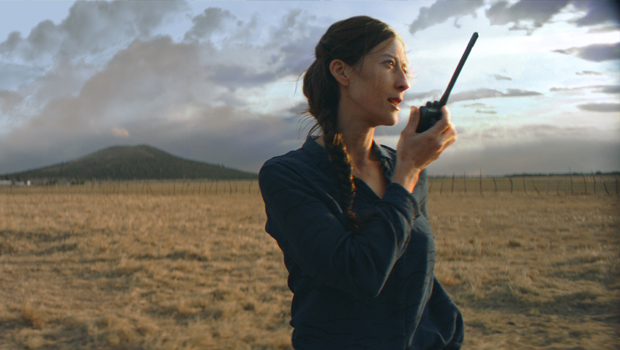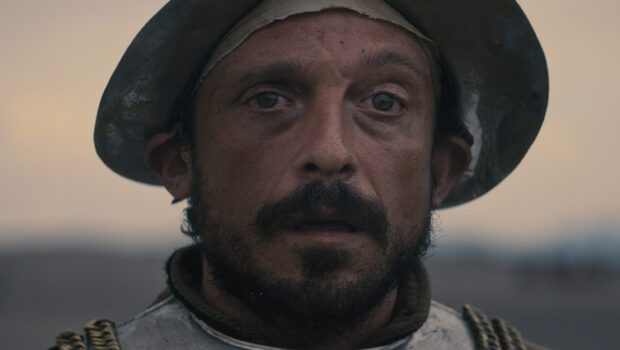Another Aleph?
Natalie Scenters-Zapico
*This essay was published in The Shared Langauge of Poetry. México and the United States Edited by Eyda M. Merediz and Tanya Huntington
In September of this year, I went on the hunt for a large-scale printer on my university campus. I had heard that there was a large-scale printer that once belonged to the Department of English, but after scouring our printing room I could find no such thing. I asked each of my colleagues if they knew where I could find a large-scale printer. And each of them replied similarly, they spoke of a former Digital Humanities Lab that had once belonged to a now retired faculty member that was in a building no one could remember the name of. All of them would point north and say it was somewhere over on that side of the campus.
I needed a large-scale printer because I wanted to print poster-sized poetry broadsides cheaply for the Department’s poetry library. I inherited the poetry library as the new poet hired in the department. The other Professor of Poetry, and by this I mean the other professor who works with me in the rotation of teaching the poetry curriculum, has been on medical leave for the last couple of years and teaches virtually now. Regardless, just about all my colleagues consider themselves poets in addition to their prose genre. And some of these colleagues have indeed published collections of poetry. Nevertheless, despite this surplus of poets the poetry library had fallen into a state of abandon.
The poetry library is enclosed in walls of glass on two of its four sides. The view from the glass overlooks a dark brown carpeted hallway and a series of closed doors that belong to professors I rarely see. The space had become a storage closet for the English Department, holding floor-toceiling boxes of books and notes left behind by retired professors, life-time achievement awards for faculty long gone, and stacks of framed photos of professors that once hung in the hallway. The bookcases had been graffitied with slurs I will not repeat, and phrases like cum in me bro. No one had noticed the graffiti because the light switch had been ripped out of its socket and the fluorescent light bulbs were all burned brown. I had inherited care over the abandoned poetry library, not because it was in my job description, nor because I needed to do this as departmental service, rather because as a poet I could not stand to see something labeled a poetry library and go so abused.
Since September, I have cleaned up the library including the graffiti, removed all non-poetry related materials, and created a digital catalog of the poetry collections and other poetry related items using a cheap software called Libib. As part of this clean-up effort, I decided to print a series of posters featuring my colleagues’ poems to hang on the walls. I could have, of course, ordered such posters to be made. But with no budget for the poetry library, I thought finding a way to print them by gaining access to a large-scale printer would solve my problem.
While designing these broadside posters, I ran into my colleague Jarod Rosselló, a Cuban American cartoonist, who wanted to check out the newly usable space. I decided to ask Jarod again about access to a large-scale printer since, as a comics guy, he has an interest in all things print-arts. This time Jarod offered to walk me to the building where the forever lost Digital Humanities Lab once held this missing large-scale printer. As we walked to the building Jarod explained that we lost the Digital Humanities Lab, but perhaps we could get it back somehow in another iteration.
The first space we entered in the building was home to a Virtual Realities Lab. Students were sitting in chairs fully equipped with VR goggles exploring a realm separate to our own. Equipment of all kinds lined the walls of the five-room Lab and I felt like a child in a museum of things I could not touch while we waited to speak to the Director. The Director of the VR Lab was very excited to speak to us as she exited her office. I stayed quiet and observed. Jarod asked her what had happened to the large-scale printer and Wacom tablets that belonged to the DH Lab. She thought for a moment, as though considering whether to divulge this information, and then pointed behind a scrim where the large-scale printer was taking up a quarter of the wall, and then to the Wacom tablets hidden in a cabinet.
“I’m willing to give them up,” she said generously, “as long as they get some use.” We thanked her and left. I really only needed one-time use of the large-scale printer, I didn’t need to keep (nor did I have room for) the physical printer, but Jarod saw it another way. “We should see if the college will give us money for a book studio,” he said. And so, we began investigating how to create a book studio unlike any other we’d seen.
What I share next is part of a proposal that I have been working on with my colleague Roselló that we hope our university will fund. I say this because for now it exists entirely in our minds and on the page. But I share all of this with you today because I think the projects we hope to make in our book studio push the boundaries of what the topic of this panel asks of us: “In what ways have these systemic changes that have altered the actual materiality of our literary world and experience procured new approaches to poetry?”
The Book Studio we are currently envisioning will be called El Aleph. It will be an interdisciplinary studio space dedicated to exploring the relationship between the material and immaterial in the digital era. Named after and inspired by a short story by Jorge Luis Borges (1899-1986), “The Aleph,” the book lab will focus on the creation of the book object as a singular point in which infinitesimal immaterial worlds are held at once. As Borges explains, the Aleph is the first letter of the Hebrew alphabet and is “… the only place on earth where all places are—seen from every angle, each standing clear, without any confusion or blending” (10-11). El Aleph will center on the creation of book objects made with physical materials whose final product is meant to exist in digital realms, alongside book objects that are created digitally but are meant to exist as material books. Letterpress, bookbinding, and block-printing stations will be housed alongside large format scanners, printers, tablets, computers with adobe creative suite, and VR digital systems for the creation of virtual-experience novels and poems.
Though we expect the interests of El Aleph to change overtime and alongside technological advances, we are interested in ambitious projects that attempt to create Alephs. That is to say, projects that attempt to create a singular object that contains infinitesimal worlds at once. Of course, to create an actual Aleph is an impossibility. Yet, if we give in to that impossibility at the outset and lean into the potential of imaginative failure what can we create? It is this kind of imaginative rigor that makes me want to keep writing.
Potentials for the poem in the digital realm have not yet really been explored. We currently use online spaces in poetry to create equity of access, like the incredible archive of poems hosted for free by the Poetry Foundation. I, for one, can’t imagine my teaching life without such easy and free spaces available for my own use and the use of my students. We also use it to take photos of printed works to post online through social media, creating a digital identity for our poems that would otherwise only have the readership of those who have access to subscriptions to those magazines. And of course, there are literary journals that exist entirely online. The recognition of the literary rigor that these online magazines have editorially are especially important to my mind because they create access for the differently abled to engage with work previously unavailable to them. We also use online tools like google docs that allow entire manifestos to be composed by many people at once all working in the same document, something that would have been an impossibility before unless you were living near those people.
Still, each of these important efforts that has brought poetry to people who previously might not have had access, is only innovation in terms of the archive. In each of these examples we still imitate physical book objects and restrict our imaginations to the white rectangular page. Scott McCloud explains in his essay on the “Infinite Canvas” that we are at a point of reckoning in that we are too tied to our taught iterations of the page, the poem, the book, and not opening our minds up to the potential these new forms of engagement offer us McCloud, who is a cartoonist, is of course not talking about poetry, but I think that what he says can apply to us as poets readily. He describes the Infinite Canvas as, “…a challenge to think big; a series of design strategies based on treating the screen as a window rather than a page.” In this way, how we move in online spaces does not have to be from left to right, and top to bottom. Though I confess I am very tied to my laptop and the way that it confines me to a kind of rectangle, I’m learning more and more from my reading and from my students interested in virtual design technologies that this form of engaging with the world might not last forever. In fact, recently Facebook changed its very name to Meta as an investment in what is being called the MetaVerse. And though I do not have time to get into the ethics of such a space, I think if the last twenty years has taught us anything it is that we will be forced to engage and grow dependent upon those spaces no matter the abuses that go on along the way. So, if it is an inevitability, which I think it is: how then, will our poems change to engage in this new world?
One answer to the Infinite Canvas question is to lean into the creation of Augmented Realities in our poems. In my new work, I have grown interested in the violence of surveillance technologies. From my sofa in Tampa, Florida I can watch a live video feed of people crossing the Santa Fe bridge in downtown El Paso, the same bridge I grew up crossing, any time I want. In this way, my very nostalgia, no matter how innocent, makes me a dangerous part of the panopticon. The panopticon of border surveillance is not just for agents of the state anymore, but also in the hands of the average person. In this way, we blur the boundaries between surveillance of the state and the documentation carried out by ordinary individuals.
However, the question posed for this panel today feels to be more about the imaginative potentials of digital realms. So I’d like to pivot here slightly, á la Borges, to remind all of you that poetry is an especially exciting genre to be discussing this, because poetry pre-dates the written word. If you look up the “History of Poetry” on Wikipedia (Wikipedia, our formerly ostracized now welcome child of the internet), it begins with a kind of reminder that “Poetry as an oral art form likely predates written text. The earliest poetry is believed to have been recited or sung, employed as a way of remembering oral history, genealogy, and law. Poetry is often closely related to musical traditions …” The Wikipedia entry begins with an explanation that poetry began as “a verbal art,” and in this way many of the characteristics that we associate with poetry like rhyme, meter, alliteration, assonance, etc. are deeply tied to how we listen to music. And like music, which the musician usually memorizes before playing it in front of an audience, the poet too would memorize before reciting. The formal constraint of recitation greatly impacted the literary devices used in these early works. And forgive me for fast-forwarding through large swaths of time, but we see poetry reckoning with the new dimensions it is asked to be contained in ever since. First, the influence of the physical edge of the page when people start writing poems down on tablets and then expensive paper, then with the invention of the printing press, then again as mass distribution of texts becomes more readily available, again with the advent of the internet (anyone can publish a poem at any time!), and now where we must reckon with the very virtual world we spend most of our days in.
In El Aleph I hope to work on and give space to poets much more talented than myself. I hope El Aleph will create poems that exist in the digital realm and in the material realm, poems that use Augmented Reality to engage with how we document painful sites that otherwise seem to cover-up their complicated pasts, poems that question the very movement of the eye on screens vs. the page. And perhaps, this new era will welcome a pivot away from the written text of the poem and spotlight underrepresented voices that focus on the power of the aural experience in the age of streaming. But, perhaps most optimistically, while just a few decades ago people were busy writing about the demise of the poem, I think that these digital realms have only created a renewed interest in the power of poetry.
***
Counterpoint: Reality Check
Last year, I finally decided to see an ophthalmologist. I’d had trouble with my vision for a while but hadn’t had the insurance to see a doctor. So, like many I sucked it up and just used a series of readers from the pharmacy. But after finally securing stable income, with vision insurance, I decided to get a diagnosis. When I went to the doctor, I expected him to tell me that I had problems with my vision because, probably like most people in this room, I often read in low light. But after going through a series of exams he told me that yes, I did need glasses because of some damage to my vision from reading, but that most of my issues were due to a visual processing disorder. He told me, “Most people with your problem are terrible readers.”
Visual processing disorders are interesting because they are not a problem of the eye, but a problem in the brain. These disorders are marked by the brain’s inability to identify, organize, and process visual information. In other words, as you engage with a text, written or otherwise, your brain begins to malfunction because it cannot handle all that you are giving it. The treatment varies, but usually involves wearing glasses to help stabilize vision, and a series of therapies to train your brain to withstand large doses of information more readily.
I tell you this story of my visual processing disorder because I think that we find ourselves in a moment when, like this disorder, we are all in a state of overwhelm when we enter the internet. And just as I powered through when I was younger, through the migraines and the blurry vision, I think that many of us power through an impossible amount of reading on online platforms. In this way many of us look for places that help us to narrow down the sense of overwhelm. It begins innocently enough; we find magazines or editors that have a similar aesthetic taste to our own and limit ourselves to that reading. Or, we corral ourselves to reading mostly the poems that are being posted by a self-curated group of people that we follow on social media. And, because we have so much other reading to get through (student papers, committee proposals, etc.) this becomes a dangerous crutch that only helps us to imitate the same hegemonic structures that have existed for centuries in print culture. In this way, digital platforms can democratize in the sense of access, but they can also overwhelm and cause a tuning in to only the voices we surround ourselves with.
In this way poetry, literature, and publishing must reckon with what all of us are dealing with now: How to lessen the overwhelming nature of the internet? In The New Yorker’s September 24, 2021 issue, an article by Chris Hayes titled “On the Internet, We’re Always Famous” begins with a description of an installation of a pair of fennec fox ears in the children’s section of the Bronx Zoo. According to Hayes the fennec fox ears installation allows one to put your head between the two ears and hear as the fennec fox does. That is to say, hear everything for miles around you. Hayes describes it as an instantly overwhelming experience, that then causes one to mentally tune certain things out and tune certain sounds in. He then uses this as a metaphor for how we experience the internet in a nuanced breakdown of how overwhelming the internet as a place has become.
Another important part of this overwhelm is that we live in an era where most of us are tasked to be content creators. It is no wonder to me that Creative Writing programs are what keep many English Departments in this country afloat. Everyone wants to learn to be a better content-creator: to get more attention for their brand, which is often themselves. I say this not to finger-wag from a distance, but rather because I know I participated in this attention economy as it was being built in the aughts, and still do even if less so today.
In studying surveillance technologies for my work, I identify two extremes: being known, that is to say, to be somebody; and being unknown, that is to say, to be nobody. To be somebody is to be a person of value and interest; to be nobody is to be a person who is either not of interest, or who cannot be held to account. In this era where everyone must show that they are somebody, it is a common fantasy to want to become a nobody. More and more internet culture asks us to document and publish our daily lives with our name and location attached. Perhaps this is why I’m so drawn to the poem “I’m Nobody! Who are you?” by Emily Dickinson (1830-1886) that goes:
I’m Nobody! Who are you?
Are you – Nobody – too?
Then there’s a pair of us!
Don’t tell! they’d advertise – you know!
How dreary – to be – Somebody!
How public – like a Frog –
To tell one’s name – the livelong June –
To an admiring Bog!
I’ve been teaching Dickinson again more recently to my students because poems like these don’t feel distilled to 19th century concerns. The concerns of Dickinson are the same concerns of today. To stand out as a somebody is expected in the culture, even when it leaves one vulnerable to the bog. And, perhaps, it’s not that the poet doesn’t want to engage with the bog, but rather that some poets would prefer their work do that for them.
Like many, I had hope ten years ago that social media and easy access to building websites would create more room for voices that had previously been silenced. And I do think that it partially has. There are many voices we hear today that perhaps would not have been heard before. But I also believe we are in a different place with digital realms than we were even five years ago. Today, our very technologies help to amplify certain voices more loudly than others and in our state of overwhelm, it’s difficult to know which sounds to tune in and which to tune out.
*This essay is part of to the book The Shared La gauge of Poetry. México and the United States by Eyda M. Merediz and Tanya Hungtington.
Works Cited
Borges, Jorge Luis. “The Aleph.” The Aleph and Other Stories, 1933- 1969. Ed. and trans. Norman Thomas Di Giovanni. New York: Bantam Books & E. P. Dutton, 1971, pp. 3-17.
Dickinson, Emily. “I’m Nobody. Who are you?” Poets.org, Academy of American Poets, https://poets.org/poem/im-nobody-who-areyou-260. Accessed 30 Nov. 2022.
Dickinson, Emily. The Poems of Emily Dickinson: Variorum Edition. Ed. Ralph W. Franklin. London: Belknap Press of Harvard University Press, 1998.
Hayes, Chris. “On the Internet, We’re Always Famous,” The New Yorker, 24 Sep. 2021, https://www.newyorker.com/news/essay/on-the-internet-were-always-famous Accessed 30 Nov. 2022.
McCloud, Scott. “The ‘Infinite Canvas’.” Scott McCloud Journal, February 2009, http://scottmccloud.com/4-inventions/canvas/. Accessed 30 Nov. 2022.
Wikipedia contributors. “History of poetry.” Wikipedia. Wikipedia, The Free Encyclopedia, 14 Sep. 2022. https://en.wikipedia.org/w/ index.php?title=History_of_poetry&oldid=1110265633. Accessed 30 Nov. 2022.
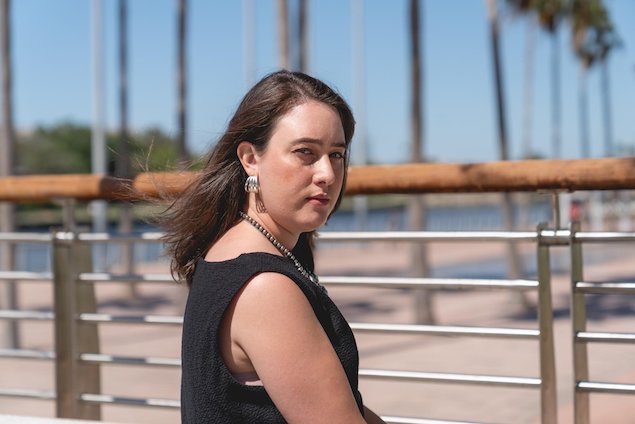 Natalie Scenters-Zapico is a fronteriza from El Paso, Texas. She is the author of Lima :: Limón (Copper Canyon Press 2019) and The Verging Cities (Colorado State University 2015). Her third book is forthcoming Spring/Summer 2025 from Copper Canyon Press. Winner of Yale University’s Windham Campbell Prize (2021), she has held a Ruth Lilly and Dorothy Sargent Rosenberg Fellowship from the Poetry Foundation (2018), a Lannan Literary Fellowship (2017), and a CantoMundo Fellowship (2015).
Natalie Scenters-Zapico is a fronteriza from El Paso, Texas. She is the author of Lima :: Limón (Copper Canyon Press 2019) and The Verging Cities (Colorado State University 2015). Her third book is forthcoming Spring/Summer 2025 from Copper Canyon Press. Winner of Yale University’s Windham Campbell Prize (2021), she has held a Ruth Lilly and Dorothy Sargent Rosenberg Fellowship from the Poetry Foundation (2018), a Lannan Literary Fellowship (2017), and a CantoMundo Fellowship (2015).
Her first book, The Verging Cities, won the PEN/America Joyce Osterweil Award (2016), the GLCA New Writer’s Award (2016), and the Utah Book Award (2016). Her second book, Lima :: Limón, was a finalist for the Kingsley Tufts Poetry Prize (2020) and shortlisted for the Griffin International Poetry Prize (2020). Her books have been reviewed widely in publications like The New Yorker, NPR, The Washington Post, and Publisher’s Weekly. Natalie’s latest poems from her forthcoming third book have been published or are forthcoming in The Paris Review, Kenyon Review, Colorado Review, New England Review, Georgia Review, Narrative, and more.
She teaches in the undergraduate and MFA creative writing programs at the University of South Florida, where she won a USF 2022 Faculty Outstanding Research Achievement Award (ORAA) and a 2023-2024 McKnight Junior Faculty Fellowship. She is Director of the Michael Kuperman Memorial Poetry Library at USF. Natalie currently lives in Tampa with her husband, young son, suegros, and little dog.
Posted: August 31, 2024 at 8:10 am


